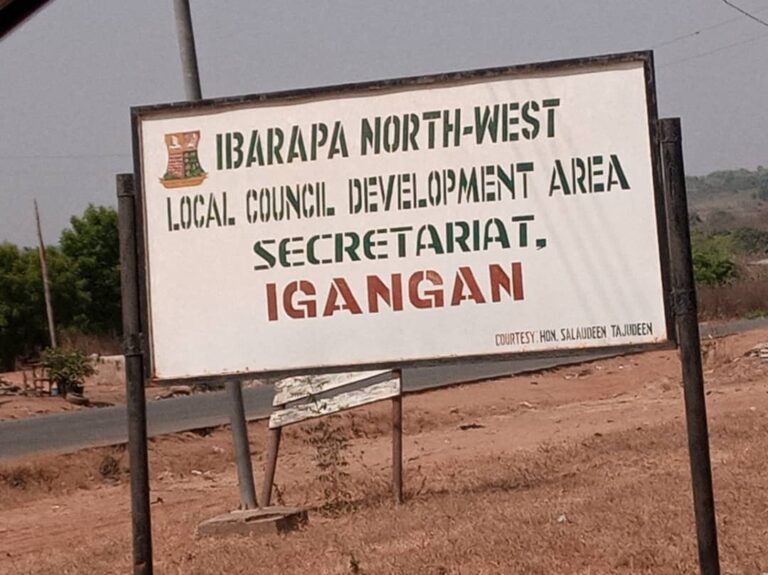Tajudeen Omideyi, a food and cash crop farmer in Igangan area of Ibarapa, Oyo state, said he lost his brother to a minor dispute with herders on his cashew farm.

According to him, his brother found some Fulani women on the farm harvesting cashew seeds and chased them away. A day after the incident, he was attacked on the farm, tied to a cashew tree and beheaded.

He said the death of his brother did not extract any remorse or emotion from his attackers when the matter was reported to their leader, Seriki Saliu. Omideyi said rather than being shown sympathy for losing a brother, the assailants planned to murder him for raising his voice at them.
He said: “Seriki Saliu was a lord in Igangan before Igboho (Sunday Adeyemo, a youth leader) came to chase him out. His men killed my brother. They tied him to a cashew tree on his farm and cut his head. Nothing was done to his killers.

“I was lucky to be alive after being attacked by Fulani herdsmen. It happened five years ago. Later that year, I was in my farm when one herder called Aliu led his colleagues to attack me with cutlasses.
“When they could not overpower me, they used clubs to beat me. The fight lasted more than one hour. Aliyu is a cousin to the dreaded Seriki Saliu who was chased away by Igboho. When I reported to the police, Aliu was arrested but Seriki paid for their bail and scuttled police investigation.”
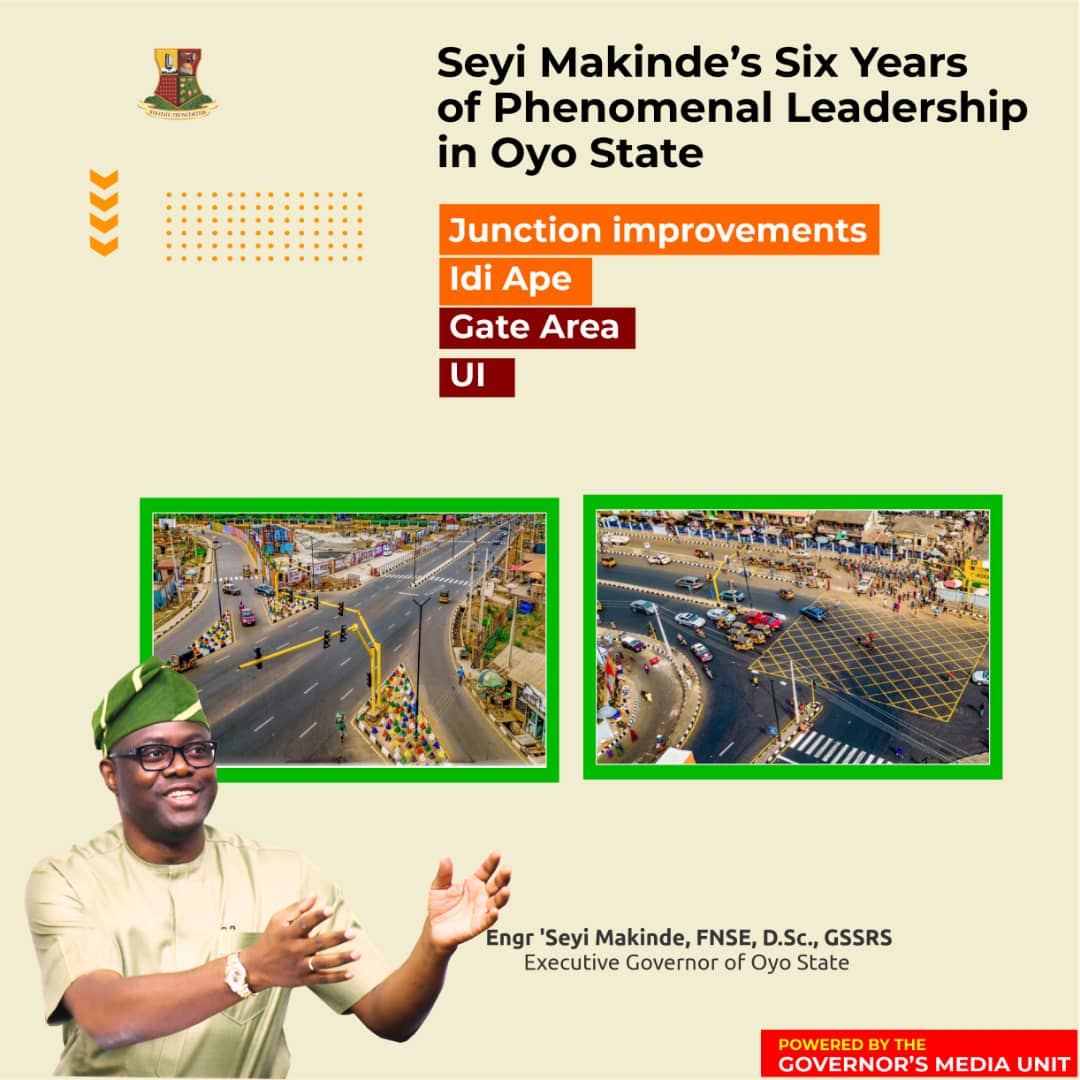
The allegations from farmers and residents of Igangan and other towns in Ibarapa were similar when TheCable visited the area.
Igangan, Eruwa, Aiyete, Tapa, Idere, Igbo-Ora and Lanlate are the seven towns in Ibarapa land, Oyo state. With a population in the excess of 700,000, the seven towns have about 120 villages that are predominantly occupied by the Yoruba, and with a mixed population of people from other ethnic extractions.
Ibarapa land is reputable for being fertile; enough to be known as an area that has produced more twins than any other place in Nigeria. Traditionally, the indigenes also savour the productivity of their vast land. They practice agriculture, growing abundant food and cash crops that are exported to other south-west states.
In 40 years, Ibarapa people had lived happily with their visitors who are majorly herders from the north. The herders, having found peace in the land of their host took advantage of the 2,496 square kilometers of geographical land size in the area to rear cattle. Over the years, both groups had benefitted from the mutual existence, with inter-marriages and businesses partnership thriving among them.
But the oasis, under which their peaceful coexistence thrived, seemed to have withered, with both groups now sworn enemies.
When TheCable visited the area, residents lamented destruction of farmlands, kidnapping and rape, accusing the herders of perpetrating the crimes.
During the visit, TheCable understood that there are two sets of the Fulani who live in Ibarapa area. There are some who live in the towns among the people and engage in other line of businesses apart from cattle rearing.
This set Fulani people rent or build houses on purchased lands in the heart of each of the towns and they also negotiate lands on lease for farming. Having lived there for many years, they speak fluent Yoruba. Some of the residents who spoke to TheCable said the Fulani that live among them are peaceful people.
The other set of the Fulani are majorly the core herders who live in settlements on the edge of the forest. They have principals who employ them as shepherds of their cattle and they come to town occasionally to buy essential needs. They are also seen regularly at cattle market, locally known as kara, on market days.
Residents said they are largely unknown since they are rarely seen in public and sometimes unfriendly. They are also accused of going around the forest with dangerous weapons, especially AK-47 rifles. Residents alleged that the herders lead cattle to graze on farmland and confronting farmers with the intent to injure or kill.
Investigation by TheCable revealed that those who employ the herders are heads of Fulani communities in Ibarapa. They also live in compact settlements located on the edges of the towns. Two of the notable ones are Seriki Saliu Abdulkadri and Iskilu Wakili.
While Saliu lived in Igangan for about 40 years, 70-year-old Wakili claimed to have been in Ibarapa for more than 30 years. Residents who have interacted with the two men alleged that trouble began some years ago when herders from outside Nigeria, especially Mali, were recruited by the leaders, taking advantage of Nigeria’s porous immigration system.
IGBOHO AND EXPULSION
After reported series of clashes between herders and farmers, raping and kidnapping, Sunday Adeyemo, a youth leader popularly known as Sunday Igboho, issued a seven-day eviction notice to herders in Ibarapa, blaming them for insecurity in Oyo state.
Seriki Saliu had to flee his abode in Alagolo area of Igangan before the expiration of the ultimatum, relocating first to Kwara state. During a news conference in Ilorin, he denied allegations of any link with kidnappers, claiming that his property, worth, N500 million, were destroyed during an attack by Igboho’s men on his house. He also claimed that seven people were killed during the attack.
On his own part, Wakili was expelled from his settlement in Kajola, by a team of security men led by Oodua Peoples Congress. He was taken to the State Criminal Investigation Department in Ibadan after his arrest. However, those who arrested him were picked up by the police and later released.
Wakili was later charged for kidnapping and murder and remanded in prison custody in Ibadan, while the OPC members who arrested him were arraigned for murder, arson and belonging to unlawful association.
IGANGAN MONARCH THREATENED
TheCable was told that before Igboho’s coming, some youths of the town had threatened to burn the palace of Oba Lasisi Adeoye, the traditional ruler of Igangan, accusing him of trading the peace of the town for personal gains from leaders of the Fulani community.
Abiodun Adegoke, a farmer and a youth leader in the town, told TheCable that the youths also threatened to evict the local government chairman in the area.
He said: “We once accused the king of Igangan of trading his own people for what he was getting from the herders. We wanted to burn his palace because we were angry. We also told the chairman of our local government to leave the seat if he could not administer rule over herders.”
But when TheCable confronted the king of Igangan with his peoples’ allegation that he was a friend of Seriki Saliu and that people of the town had the notion that he did not use his relationship with him to curb herders’ menace, he said on several occasions, he complained to Seriki Saliu on behalf of farmers when their farms were destroyed.
“I know Seriki very well. He has been here for about 40 years before he became Seriki Fulani of the whole of Ibarapa north. In fact, I met him here,” said the king.
“Each time my people brought complaints to my palace, I would call Seriki and report to him that his people were destroying farms and attacking my people. Sometimes, he would react positively, in other times, such matter would go to court but our people always return losers despite being wronged. It shows that the justice system is biased.”
SERIKI NO LONGER WELCOME
The king said he was happy that the Fulani leader left Igangan, saying he would never be welcome to the town again.
“Seriki has not called me to state that he is returning to Ibarapa one day, but if he plans to return here, I will not welcome him. Some of his people might be agitating for his return, but never will he be allowed to come back here.”
The monarch also debunked Saliu’s allegation that his property was destroyed with seven persons killed.
He added: “We thank God that there was no violence during his exit. He left peacefully. Igboho is our savior in the hands of Seriki and the herders. He told Seriki to leave and he complied.
The king said before Igboho stormed Igangan to issue eviction notice to Seriki and herdsmen, he visited his palace to seek permission from him before approaching the herders. He said Igboho assured him that the process of eviction would not involve violence.
MONARCH’S SON ARRESTED, IMPRISONED
According to the king, his son was wrongly accused, arrested and put in police custody. After his release, he was kidnapped and only regained freedom after N4 million ransom was paid.
He said: “After herders’ cattle ate up my son’s farm, he was arrested and locked up by police in Ibadan. When I approached Seriki Sasa, he instructed the SSS to release him.
“Some of the herders have spent 40 years in Igangan and Ibarapa area. But when the bad ones mixed with them, we started experiencing kidnapping. They have left town now but they hang around kara (cattle market) after they were asked to go.”
But despite the expulsion of Seriki Saliu, there are still pockets of clashes between farmers and some herders.
“It was not Seriki alone that left. Many of them have gone. But we are surprised that there is still record of attacks and destruction of farm lands in the town. It shows how criminal minded some of them are,” the king said.
WHAT I TOLD MAKINDE IN SECRET
As part of his effort to stem cases of crisis in the area, Seyi Makinde, the Oyo state governor, visited the king in his palace. During TheCable’s visit to the palace, the king revealed what he discussed with the governor in secret.
He said: “As the king of Igangan, I spoke to governor Makinde in secret before coming to the public when he visited this town.
“I told him that we do not like the way we were being oppressed by a particular ethnic group in Igangan. It has lasted over seven years. We had in the past notified other governors before Makinde. The governor said he would alert the federal government on our plight and do the right thing.”
PRINCE’S ORDEAL IN KIDNAPPERS’ DEN
Aderoju Monsur, the son of Igangan king, said he no longer feels safe in his land of birth. While relating his experience in the hands of kidnappers to TheCable at Igangan palace, Monsur said the four days he spent with his abductors were filled with pain from constant beating. He said his abductors subjected him to inhuman treatment.
“After finishing praying in our family house on January 4, 2021, we all dispersed to our various homes. As I was getting home, the kidnappers appeared from nowhere and entered the house with me. I was overpowered and taken away. I spent four days in their den. They collected N4 million ransom before they released me.
“During the four days, we were walking round the forest. My face was not covered while walking but each time we stopped to rest, they would cover my face. We did not sleep in one place. Every day, we changed location. After the ransom was paid, they told my family to come and collect me at Ofegun road. They brought me out after the money was collected. They were six in number.
“While I was in their custody, they would tie my hands behind me and cut several sticks with which they beat me each day,” said the prince. The prince’s case was the last kidnapping in the area after Seriki Saliu left.
“After my kidnap and after Seriki was made to leave, there was no more case of kidnapping. He may be boasting that he would return to Igangan, but we will not accept him and his people among us again,” he added.
Being kidnapped was not his only sad experience in the hands of the herders. While echoing farmers’ frustration, attacks, raping of women and alleged police bias in the area, Monsur said he was framed up for killing cows and sent to prison.
Monsur said: “Sometime ago, herders led their cattle to my 20 acre maize farm and ate part of it. I reported it to the Fulani community head and they begged me, so I forgave the herders. Three days after, they brought the cattle to the farm again and fed them with my crop.
“Unfortunately, three cows died there. Apparently, they had eaten poison from somewhere before coming to my farm because I did not put poison on my farm. I was accused of killing the cows, arrested and taken to Ibadan where they locked me up for three days.”
SERIKI SASA TO THE RESCUE
“It took the intervention of my father, Seriki Sasa in Ibadan and prominent Ibarapa people before I was released. They meant to send me to jail for a crime I did not commit. I was told that there was an order for me to be taken to Abuja immediately,” the prince said.
When TheCable visited some of the Fulani settlements in Igangan, they were deserted. Pelemo, a local guard said since Saliu left, most of his people had moved out while the few that remained visit the settlements once in a while.
INVESTORS SCARED AWAY
During the visit to Ibarapa, some of the farmers said access to loans from banks and cooperative societies to grow crops have dried up because of the fear that the farms could be destroyed.
Akintola Olusola, a farmer who also lost his brother to herders’ attack, and whose sister-in-law was kidnapped and released after N4 million ransom was paid, said he became bankrupt after his harvest was set ablaze by herders for refusing to allow their cattle graze on his farm.
“We spend millions of naira to cultivate land for farming. Most often, we seek bank loans and money from cooperative societies to farm. But no one is ready to risk giving us loans because of the crisis,” he said.
“After I graduated from school many years ago, I looked for work but I could not find one. I decided to go into food crop production. It has since grown in wide proportion and I have employed dozens of people over time.
“My first encounter with them was in 2015 and it has not stopped since then. After harvesting my crop, the remaining ones that we could not ship to town were kept somewhere in the farm.
“By the time I returned with a truck the following morning, the crops were gone. The herders brought their cattle and fed them with my crops. You could tell by what they left behind; the mark of cattle bite was evident. After I complained about it, they denied it.
“On December 30, 2015, I was at home while my workers were harvesting maize in another farm I had. It was a large farm and harvesting had begun three weeks earlier. We had a barn in the farm where we kept the harvested maize. After I finished working on another farm, I decided to check the labourers in the maize farm. I saw them struggling with some herders who had brought cattle to the farm.
“I confronted them and asked them who their masters were but they left. They returned at night after we had left and set the barn ablaze, burning a year’s labour in the process. They burned everything. On December 31 when I got there, I saw the damage. I was lucky to have gone there with my son who held me and consoled me.
“I reported to our people and told them I recognised the herder that came a day earlier. But till date, we could not see him.”
Losing his harvest was not the only encounter he had with the herders, in another attack in 2018, he almost lost a hand. According to Olusola, herders beat him with clubs and broke his arm. He could not work for seven months while treating his injury.
Although he was offered compensation after police investigation, the amount according to him was too little to compensate his losses.
“In 2018, I cultivated 30 acres of farmland and planted cassava in it. During harvest, I was alone in the farm after vehicles loading the crop had left. From where I sat, I saw a herder coming with cattle so I quickly approached him and told him not to lead his cattle into the farm. While we were arguing, the cattle began to feed on the cassava.
“Knowing that I was alone, he brought out a cutlass and cut me several times but it could not pierce my skin. Then another herder appeared on the scene and used a club to hit me. I defended with my hand but it shattered my bones. I ran away before they could kill me.
“I reported the case at a police station immediately and I told them I knew my attackers. Four days later, the police from area command came but they only found his father. While trying to arrest him, other herders gathered and attacked the three policemen and they fled.
“The area commander later called Seriki and told him to produce the suspect father. They offered me ridiculous amount so I rejected it till today. The money was deposited in Ibadan. I spent seven months at home treating my injury and doing no work.”
FARMERS FEAR REPRISAL
But farmers in the area said the reprieve they have with the expulsion of Seriki Saliu and Wakili would be temporary if they returned to Ibarapa. They expressed the fear that the two could be ruthless on their return.
Omideyi, whose brother was beheaded, said government must step up efforts to safeguard lives of farmers in Ibarapa, fearing food shortage and loss of means of livelihood.
“Our fear now is that if these herders’ leaders return to Igangan and Ibarapa area, they will seek revenge and start killing us,” he said.
A businessman and farmer, Abiodun Adegoke, also shared the same view.
“There is rumour that the herders have promised to return with more force. Last week, we seized a cow from a herd that ate up a farm of our member. It is still in Ayete police station, the owner did not show up,” he said.
ALLEGED POLICE CONNIVANCE
As stated by Igangan monarch, other residents and farmers who spoke to TheCable said the police are often biased in their approach to clashes between herders and farmers. They alleged that the police take side with the herders.
“Our major problem is connivance of security operatives with the herders who commit atrocities on our land,” Olusola said.
Diekola Ogunjimi, an engineer and farmer, said he spent 10 days in police custody after he sent some herders away from his family farmland. According to him, police manipulated the case, accusing him of attempting to send the herders away from a part of Nigeria.
He said: “Seriki Saliu and his boys took over our family farm land and destroyed it. We reported to the police but instead of getting justice, we were made to look like assailants. We were accused of attempting to send Seriki out of Igangan.
“We were put in a cell for 10 days for just telling the herders not to destroy our farmland. I returned as a sick man and since then, I have not had a good health.
“In the farm, we drink water from a river that has its source somewhere. Out of wickedness, the herders located the source and led herds of cow into it. The water got contaminated.”
EXTORTION
Home News INSIDE STORY: How Aborode’s Murder Shattered Decades Of Peace In Ibarapaland
NEWS
INSIDE STORY: How Aborode’s Murder Shattered Decades Of Peace In Ibarapaland
By admin – March 30, 2021 58 0
Tajudeen Omideyi, a food and cash crop farmer in Igangan area of Ibarapa, Oyo state, said he lost his brother to a minor dispute with herders on his cashew farm.
According to him, his brother found some Fulani women on the farm harvesting cashew seeds and chased them away. A day after the incident, he was attacked on the farm, tied to a cashew tree and beheaded.
He said the death of his brother did not extract any remorse or emotion from his attackers when the matter was reported to their leader, Seriki Saliu. Omideyi said rather than being shown sympathy for losing a brother, the assailants planned to murder him for raising his voice at them.
He said: “Seriki Saliu was a lord in Igangan before Igboho (Sunday Adeyemo, a youth leader) came to chase him out. His men killed my brother. They tied him to a cashew tree on his farm and cut his head. Nothing was done to his killers.
“I was lucky to be alive after being attacked by Fulani herdsmen. It happened five years ago. Later that year, I was in my farm when one herder called Aliu led his colleagues to attack me with cutlasses.
“When they could not overpower me, they used clubs to beat me. The fight lasted more than one hour. Aliyu is a cousin to the dreaded Seriki Saliu who was chased away by Igboho. When I reported to the police, Aliu was arrested but Seriki paid for their bail and scuttled police investigation.”
The allegations from farmers and residents of Igangan and other towns in Ibarapa were similar when TheCable visited the area.
Igangan, Eruwa, Aiyete, Tapa, Idere, Igbo-Ora and Lanlate are the seven towns in Ibarapa land, Oyo state. With a population in the excess of 700,000, the seven towns have about 120 villages that are predominantly occupied by the Yoruba, and with a mixed population of people from other ethnic extractions.
Ibarapa land is reputable for being fertile; enough to be known as an area that has produced more twins than any other place in Nigeria. Traditionally, the indigenes also savour the productivity of their vast land. They practice agriculture, growing abundant food and cash crops that are exported to other south-west states.
Amotekun corps on their way to Igangan
In over 40 years, Ibarapa people had lived happily with their visitors who are majorly herders from the north. The herders, having found peace in the land of their host took advantage of the 2,496 square kilometers of geographical land size in the area to rear cattle. Over the years, both groups had benefitted from the mutual existence, with inter-marriages and businesses partnership thriving among them.
But the oasis, under which their peaceful coexistence thrived, seemed to have withered, with both groups now sworn enemies.
When TheCable visited the area, residents lamented destruction of farmlands, kidnapping and rape, accusing the herders of perpetrating the crimes.
During the visit, TheCable understood that there are two sets of the Fulani who live in Ibarapa area. There are some who live in the towns among the people and engage in other line of businesses apart from cattle rearing.
This set of Fulani people rent or build houses on purchased lands in the heart of each of the towns and they also negotiate lands on lease for farming. Having lived there for many years, they speak fluent Yoruba. Some of the residents who spoke to TheCable said the Fulani that live among them are peaceful people.
The other set of the Fulani are majorly the core herders who live in settlements on the edge of the forest. They have principals who employ them as shepherds of their cattle and they come to town occasionally to buy essential needs. They are also seen regularly at cattle market, locally known as kara, on market days.
Residents said they are largely unknown since they are rarely seen in public and sometimes unfriendly. They are also accused of going around the forest with dangerous weapons, especially AK-47 rifles. Residents alleged that the herders lead cattle to graze on farmland and confronting farmers with the intent to injure or kill.
Investigation by TheCable revealed that those who employ the herders are heads of Fulani communities in Ibarapa. They also live in compact settlements located on the edges of the towns. Two of the notable ones are Seriki Saliu Abdulkadri and Iskilu Wakili.
While Saliu lived in Igangan for about 40 years, 70-year-old Wakili claimed to have been in Ibarapa for more than 30 years. Residents who have interacted with the two men alleged that trouble began some years ago when herders from outside Nigeria, especially Mali, were recruited by the leaders, taking advantage of Nigeria’s porous immigration system.

Igboho
After reported series of clashes between herders and farmers, raping and kidnapping, Sunday Adeyemo, a youth leader popularly known as Sunday Igboho, issued a seven-day eviction notice to herders in Ibarapa, blaming them for insecurity in Oyo state.
Seriki Saliu had to flee his abode in Alagolo area of Igangan before the expiration of the ultimatum, relocating first to Kwara state. During a news conference in Ilorin, he denied allegations of any link with kidnappers, claiming that his property, worth, N500 million, were destroyed during an attack by Igboho’s men on his house. He also claimed that seven people were killed during the attack.
On his own part, Wakili was expelled from his settlement in Kajola, by a team of security men led by Oodua Peoples Congress. He was taken to the State Criminal Investigation Department in Ibadan after his arrest. However, those who arrested him were picked up by the police and later released.
Wakili was later charged for kidnapping and murder and remanded in prison custody in Ibadan, while the OPC members who arrested him were arraigned for murder, arson and belonging to unlawful association.
IGANGAN MONARCH THREATENED
Oba Lasisi Adeoye, King of Igangan
TheCable was told that before Igboho’s coming, some youths of the town had threatened to burn the palace of Oba Lasisi Adeoye, the traditional ruler of Igangan, accusing him of trading the peace of the town for personal gains from leaders of the Fulani community.
Abiodun Adegoke, a farmer and a youth leader in the town, told TheCable that the youths also threatened to evict the local government chairman in the area.
He said: “We once accused the king of Igangan of trading his own people for what he was getting from the herders. We wanted to burn his palace because we were angry. We also told the chairman of our local government to leave the seat if he could not administer rule over herders.”
Adegoke, farmer, businessman
But when TheCable confronted the king of Igangan with his peoples’ allegation that he was a friend of Seriki Saliu and that people of the town had the notion that he did not use his relationship with him to curb herders’ menace, he said on several occasions, he complained to Seriki Saliu on behalf of farmers when their farms were destroyed.
“I know Seriki very well. He has been here for about 40 years before he became Seriki Fulani of the whole of Ibarapa north. In fact, I met him here,” said the king.
“Each time my people brought complaints to my palace, I would call Seriki and report to him that his people were destroying farms and attacking my people. Sometimes, he would react positively, in other times, such matter would go to court but our people always return losers despite being wronged. It shows that the justice system is biased.”
SERIKI NO LONGER WELCOME
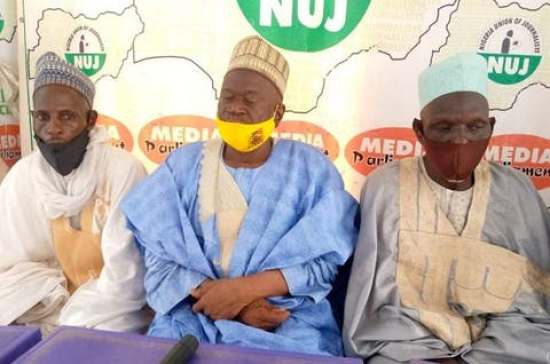
Seriki Fulani, Igangan
The king said he was happy that the Fulani leader left Igangan, saying he would never be welcome to the town again.
“Seriki has not called me to state that he is returning to Ibarapa one day, but if he plans to return here, I will not welcome him. Some of his people might be agitating for his return, but never will he be allowed to come back here.”
The monarch also debunked Saliu’s allegation that his property was destroyed with seven persons killed.
He added: “We thank God that there was no violence during his exit. He left peacefully. Igboho is our savior in the hands of Seriki and the herders. He told Seriki to leave and he complied.
The king said before Igboho stormed Igangan to issue eviction notice to Seriki and herdsmen, he visited his palace to seek permission from him before approaching the herders. He said Igboho assured him that the process of eviction would not involve violence.
MONARCH’S SON ARRESTED, IMPRISONED
According to the king, his son was wrongly accused, arrested and put in police custody. After his release, he was kidnapped and only regained freedom after N4 million ransom was paid.
He said: “After herders’ cattle ate up my son’s farm, he was arrested and locked up by police in Ibadan. When I approached Seriki Sasa, he instructed the SSS to release him.
“Some of the herders have spent 40 years in Igangan and Ibarapa area. But when the bad ones mixed with them, we started experiencing kidnapping. They have left town now but they hang around kara (cattle market) after they were asked to go.”
But despite the expulsion of Seriki Saliu, there are still pockets of clashes between farmers and some herders.
“It was not Seriki alone that left. Many of them have gone. But we are surprised that there is still record of attacks and destruction of farm lands in the town. It shows how criminal minded some of them are,” the king said.
WHAT I TOLD MAKINDE IN SECRET
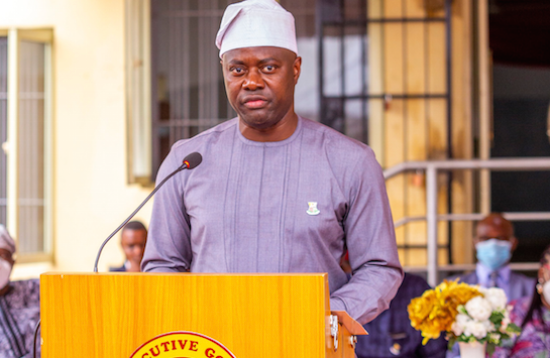
Makinde
As part of his effort to stem cases of crisis in the area, Seyi Makinde, the Oyo state governor, visited the king in his palace. During TheCable’s visit to the palace, the king revealed what he discussed with the governor in secret.
He said: “As the king of Igangan, I spoke to governor Makinde in secret before coming to the public when he visited this town.
“I told him that we do not like the way we were being oppressed by a particular ethnic group in Igangan. It has lasted over seven years. We had in the past notified other governors before Makinde. The governor said he would alert the federal government on our plight and do the right thing.”
PRINCE’S ORDEAL IN KIDNAPPERS’ DEN
Aderoju Monsur, the son of Igangan king, said he no longer feels safe in his land of birth. While relating his experience in the hands of kidnappers to TheCable at Igangan palace, Monsur said the four days he spent with his abductors were filled with pain from constant beating. He said his abductors subjected him to inhuman treatment.
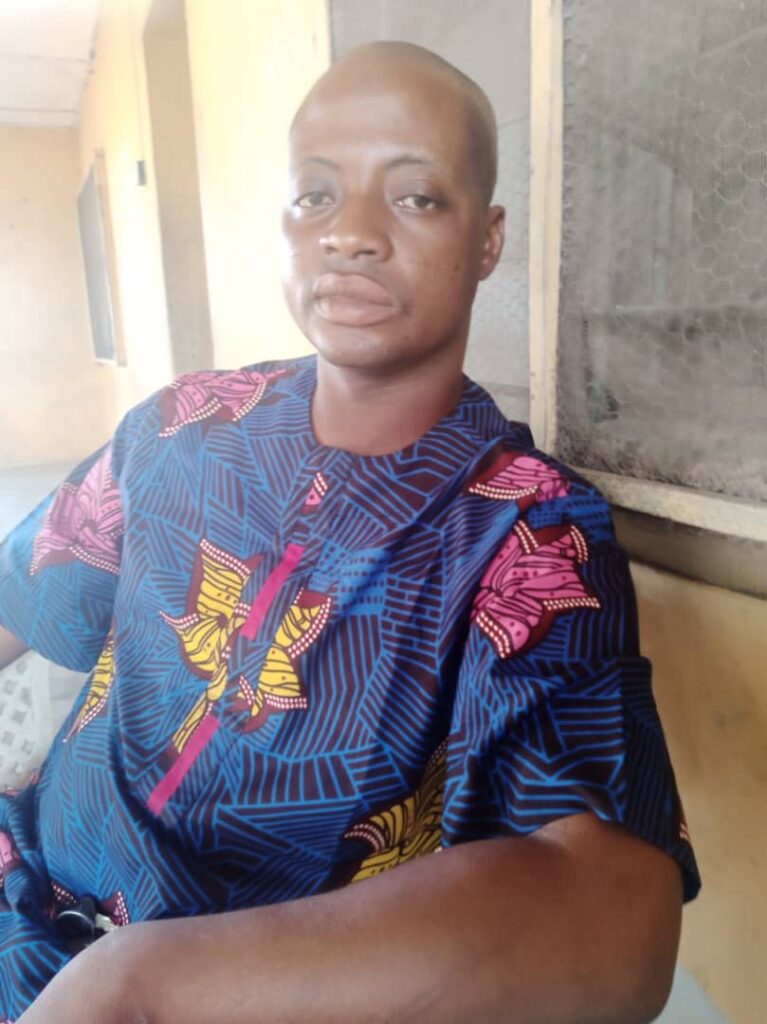
“After finishing praying in our family house on January 4, 2021, we all dispersed to our various homes. As I was getting home, the kidnappers appeared from nowhere and entered the house with me. I was overpowered and taken away. I spent four days in their den. They collected N4 million ransom before they released me.
“During the four days, we were walking round the forest. My face was not covered while walking but each time we stopped to rest, they would cover my face. We did not sleep in one place. Every day, we changed location. After the ransom was paid, they told my family to come and collect me at Ofegun road. They brought me out after the money was collected. They were six in number.
“While I was in their custody, they would tie my hands behind me and cut several sticks with which they beat me each day,” said the prince. The prince’s case was the last kidnapping in the area after Seriki Saliu left.
“After my kidnap and after Seriki was made to leave, there was no more case of kidnapping. He may be boasting that he would return to Igangan, but we will not accept him and his people among us again,” he added.
Being kidnapped was not his only sad experience in the hands of the herders. While echoing farmers’ frustration, attacks, raping of women and alleged police bias in the area, Monsur said he was framed up for killing cows and sent to prison.
Monsur said: “Sometime ago, herders led their cattle to my 20 acre maize farm and ate part of it. I reported it to the Fulani community head and they begged me, so I forgave the herders. Three days after, they brought the cattle to the farm again and fed them with my crop.
“Unfortunately, three cows died there. Apparently, they had eaten poison from somewhere before coming to my farm because I did not put poison on my farm. I was accused of killing the cows, arrested and taken to Ibadan where they locked me up for three days.”
SERIKI SASA TO THE RESCUE
“It took the intervention of my father, Seriki Sasa in Ibadan and prominent Ibarapa people before I was released. They meant to send me to jail for a crime I did not commit. I was told that there was an order for me to be taken to Abuja immediately,” the prince said.
When TheCable visited some of the Fulani settlements in Igangan, they were deserted. Pelemo, a local guard said since Saliu left, most of his people had moved out while the few that remained visit the settlements once in a while.
INVESTORS SCARED AWAY
During the visit to Ibarapa, some of the farmers said access to loans from banks and cooperative societies to grow crops have dried up because of the fear that the farms could be destroyed.
Akintola Olusola, a farmer who also lost his brother to herders’ attack, and whose sister-in-law was kidnapped and released after N4 million ransom was paid, said he became bankrupt after his harvest was set ablaze by herders for refusing to allow their cattle graze on his farm.
“We spend millions of naira to cultivate land for farming. Most often, we seek bank loans and money from cooperative societies to farm. But no one is ready to risk giving us loans because of the crisis,” he said.
“After I graduated from school many years ago, I looked for work but I could not find one. I decided to go into food crop production. It has since grown in wide proportion and I have employed dozens of people over time.
“My first encounter with them was in 2015 and it has not stopped since then. After harvesting my crop, the remaining ones that we could not ship to town were kept somewhere in the farm.
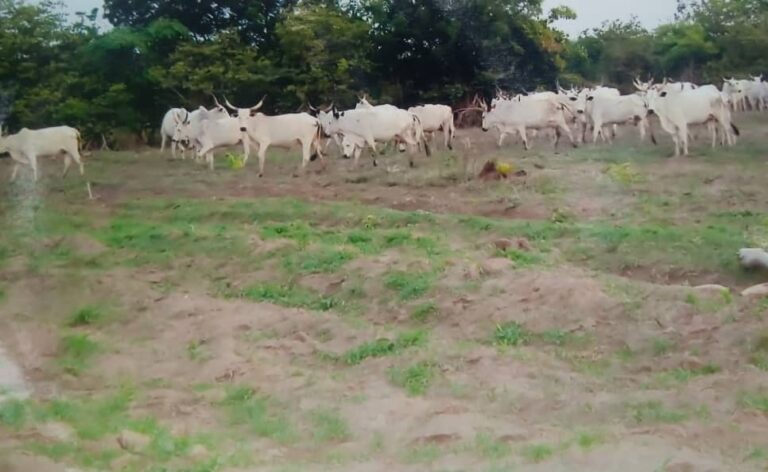
Cattle on farmland
“By the time I returned with a truck the following morning, the crops were gone. The herders brought their cattle and fed them with my crops. You could tell by what they left behind; the mark of cattle bite was evident. After I complained about it, they denied it.
“On December 30, 2015, I was at home while my workers were harvesting maize in another farm I had. It was a large farm and harvesting had begun three weeks earlier. We had a barn in the farm where we kept the harvested maize. After I finished working on another farm, I decided to check the labourers in the maize farm. I saw them struggling with some herders who had brought cattle to the farm.
“I confronted them and asked them who their masters were but they left. They returned at night after we had left and set the barn ablaze, burning a year’s labour in the process. They burned everything. On December 31 when I got there, I saw the damage. I was lucky to have gone there with my son who held me and consoled me.
“I reported to our people and told them I recognised the herder that came a day earlier. But till date, we could not see him.”
Akintola Olusola, farmer beaten by herdsmen
Losing his harvest was not the only encounter he had with the herders, in another attack in 2018, he almost lost a hand. According to Olusola, herders beat him with clubs and broke his arm. He could not work for seven months while treating his injury.
Although he was offered compensation after police investigation, the amount according to him was too little to compensate his losses.
“In 2018, I cultivated 30 acres of farmland and planted cassava in it. During harvest, I was alone in the farm after vehicles loading the crop had left. From where I sat, I saw a herder coming with cattle so I quickly approached him and told him not to lead his cattle into the farm. While we were arguing, the cattle began to feed on the cassava.
“Knowing that I was alone, he brought out a cutlass and cut me several times but it could not pierce my skin. Then another herder appeared on the scene and used a club to hit me. I defended with my hand but it shattered my bones. I ran away before they could kill me.
“I reported the case at a police station immediately and I told them I knew my attackers. Four days later, the police from area command came but they only found his father. While trying to arrest him, other herders gathered and attacked the three policemen and they fled.
“The area commander later called Seriki and told him to produce the suspect father. They offered me ridiculous amount so I rejected it till today. The money was deposited in Ibadan. I spent seven months at home treating my injury and doing no work.”
FARMERS FEAR REPRISAL
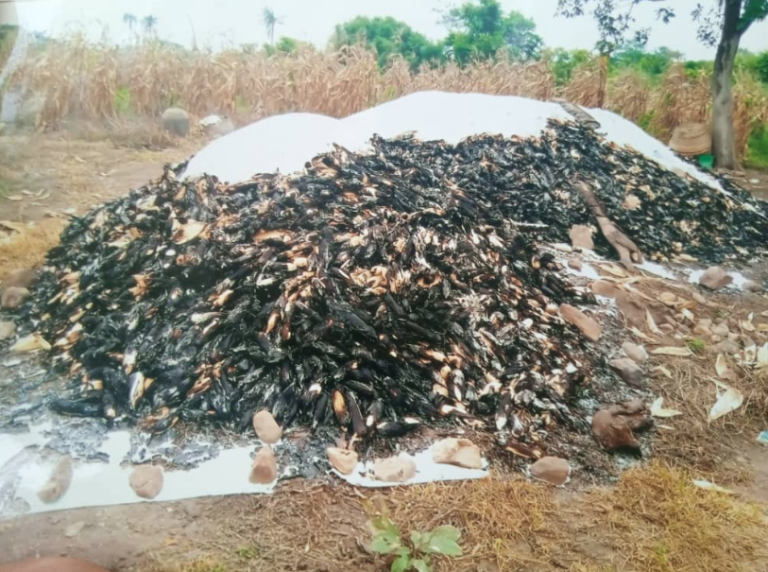
Maize harvest burnt overnight by herdsmen
But farmers in the area said the reprieve they have with the expulsion of Seriki Saliu and Wakili would be temporary if they returned to Ibarapa. They expressed the fear that the two could be ruthless on their return.
Omideyi, whose brother was beheaded, said government must step up efforts to safeguard lives of farmers in Ibarapa, fearing food shortage and loss of means of livelihood.
“Our fear now is that if these herders’ leaders return to Igangan and Ibarapa area, they will seek revenge and start killing us,” he said.
A businessman and farmer, Abiodun Adegoke, also shared the same view.
“There is rumour that the herders have promised to return with more force. Last week, we seized a cow from a herd that ate up a farm of our member. It is still in Ayete police station, the owner did not show up,” he said.
ALLEGED POLICE CONNIVANCE
Diekola Ogunjimi, farmer, engineer kept in cell for 10 days
As stated by Igangan monarch, other residents and farmers who spoke to TheCable said the police are often biased in their approach to clashes between herders and farmers. They alleged that the police take side with the herders.
“Our major problem is connivance of security operatives with the herders who commit atrocities on our land,” Olusola said.
Diekola Ogunjimi, an engineer and farmer, said he spent 10 days in police custody after he sent some herders away from his family farmland. According to him, police manipulated the case, accusing him of attempting to send the herders away from a part of Nigeria.
He said: “Seriki Saliu and his boys took over our family farm land and destroyed it. We reported to the police but instead of getting justice, we were made to look like assailants. We were accused of attempting to send Seriki out of Igangan.
“We were put in a cell for 10 days for just telling the herders not to destroy our farmland. I returned as a sick man and since then, I have not had a good health.
“In the farm, we drink water from a river that has its source somewhere. Out of wickedness, the herders located the source and led herds of cow into it. The water got contaminated.”
EXTORTION
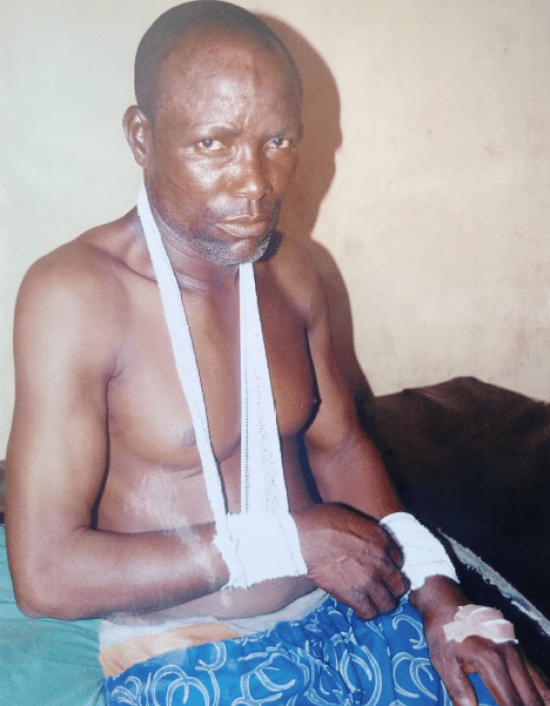
Adegoke, farmer whose brother was beheaded
Abiodun Adegoke, a businessman and farmer in Igangan, told TheCable that farmers are also forced to pay compensation to herders when their cows die even if they know nothing about the death.
“When a herder loses a cow to disease or any other circumstances, the owner of any farm close to the scene of the cow’s death is in trouble. They will accuse him of poisoning the cow. They will inform the police and from there, extortion will begin,” he said.
“On so many occasions, we have had to pay huge amount to herders for the death of their cows even when we knew nothing about how it died. This is just to allow peace to reign and because police is always on their side.”
POLICE DENY CONNIVANCE
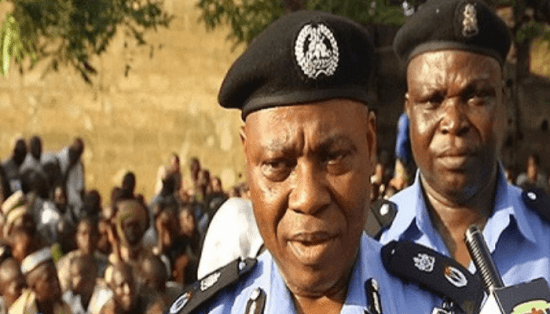
When confronted with the farmers’ allegation, Olugbenga Fadeyi, the police public relations officer in Oyo state, said the allegations were not true. He told TheCable that some of the claims by the farmers were found out to be spurious and unsubstantiated when investigated.
He said: “The fact is that all these things are not true. When they see you, they will be running their mouth but when we now come and ask them to point to us the police that they allege to have taken bribe, they will say that was not what they said. This type of thing heats up situation. Police work with evidence because judges will tell you that ‘according to evidence before me’ when giving judgment.
“When there is crisis, police will broker peace but some people will aggravate the issues unnecessarily. Someone who cultivates a land with N500,000 will claim it is N5 million. He will be demanding for ridiculous money. But they will not be able to substantiate that claim.
“Police sometimes use alternative dispute resolution method to broker peace so that there will not be crisis. Police is not a debt collector. ADR is used to minimise cases that will be charged to court. At the police station level, we look at cases, look for evidence, call the leaders and settle matters.”
Fadeyi said the constitution does not allow a situation where an ethnic group is sending another group out of a particular place in the country. He cited instances where the farmers had misled police by giving wrong evidence.
“This issue of park your load and go away is not accepted by the constitution. You cannot just send anyone away from an area anyhow for nothing. These are people that have cohabited for about 50 years.
“When they came to the area, the Yoruba leaders gave them land which some of them bought. But when there is crisis, they will start giving directives and asking them to leave; some of these things are not right and when we tell them, they will say police are taking side. Many of them needed to be educated so that they will know the position of the constitution.
“How can they substantiate the claim that police is turning case against complainants? Police do not know anybody; they look at the case on the table. Some will call us and say that in a particular place, they are killing people but when we get there, there will be nothing. They go on social media and spread false stories. They fantasise to create fears,” the PPRO added.
According to him, Ngozi Onadeko, the commissioner of police in the state, had visited the area and held meetings with stakeholders while also assuring them peace will reign again in the area.
He said: “The CP was in Ibarapa two days ago to meet stakeholders. The Fulani leaders and farmers spoke their minds. She told them she is ready to use the law on anyone that causes crisis. She said that they should report any trouble to the divisional police officer in the area.”
GOVERNMENT INAUGURATES TASK FORCE
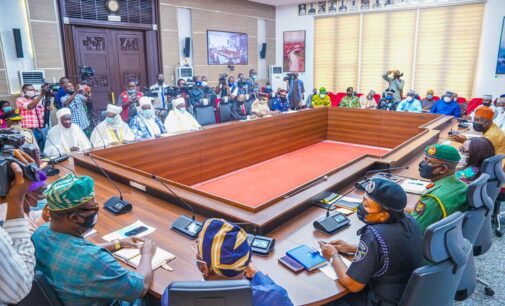
Seyi Makinde, the Oyo state governor, paid a visit to Ibarapa area, where he announced an end to open grazing.
On Monday, the governor also inaugurated the state’s security task force to tackle all forms of insecurity within the state. While inaugurating the task force at the state secretariat in Ibadan, Makinde said the committee will serve as the war room to tackle insecurity in the state.
According to him, the state will ensure that schoolchildren kidnapping, which happened in the north will not find its way into the state.
“We are looking for criminals and we know that if we are not careful, what goes around will come around. We have been hearing about the kidnapping of school children and their teachers and we do not want that to happen in Oyo state. So, we are seeking for every support that we can get,” he said.
